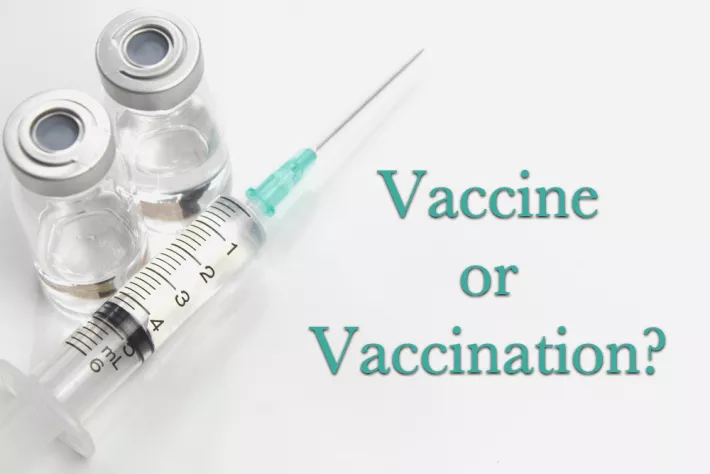A vaccine is the liquid or preparation itself, and a vaccination is what you get when someone administers the vaccine to you.
A vaccine is the fluid they inject into you or the aerosol you inhale; it's the preparation of an inactivated microbe or virus that stimulates an immune response that helps protect you from disease. For example, a nurse could say, "The vaccine arrived yesterday." Picture a tube of liquid.
A vaccination is the shot you get. It’s the introduction of the vaccine into your body. You get a vaccination when someone administers the vaccine to you.
A nurse could say, “We can start giving vaccinations now,” or “We run a vaccination clinic.”
In rare cases, the word 'vaccine' can refer to something that treats disease
We typically think of a vaccination as something that protects you from getting sick if you encounter a bacteria or virus in the future—that’s how the flu vaccine works: it won’t do any good if you get a vaccination after you already have the flu—but occasionally, scientists also use the words "therapeutic vaccine" to describe a treatment that triggers an immune response after a person has been infected with a virus or developed cancer. For example, researchers have worked on Ebola vaccines that might do both—help people resist infection and respond better after they have been infected. Provenge is a therapeutic vaccine that has been approved for prostate cancer treatment.
Why the word 'vaccination' is related to cows
The word "vaccination" was first used in the 1800s to refer to the injection of the cowpox virus to give people immunity to smallpox, a more severe related disease. In fact, the word "vaccine" comes from a Latin word meaning "from cows." According to the Oxford English Dictionary, it was Louis Pasteur who popularized the use of the term more broadly in the late 1800s to refer to any formulation that prevents disease in this way.
In summary, the vaccine is the liquid or preparation itself, and a vaccination is the act of administering the vaccine.
Sources
Questions and Answers on Experimental Treatments and Vaccines for Ebola (CDC)
Canada’s Ebola Vaccine: How Does It Work?
New Ebola Vaccine Study Has Begun in Maryland
Treating Diseases With Vaccines (WebMD)
Oxford English Dictionary "vaccination"
Image courtesy of Shutterstock




